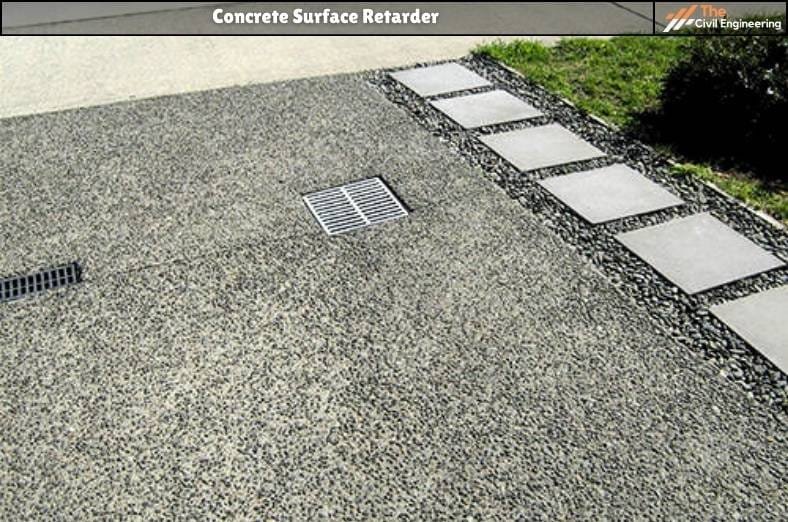Concrete Retarders are used in fresh concrete to chemically delay the set of the surface for up to an hour.
They are normally utilized in hot weather conditions to minimize the rapid hardening due to high temperatures, thus permitting the time for mixing, transporting, and placing. Concrete retarders are also used as water reducers.
1. Concrete Surface Retarder
Surface retarders also called surface “deactivators,” are applied to fresh concrete to chemically decrease the set of the surface concrete.
Unlike concrete retarders, they permit the rest of the concrete to cure normally, without affecting the setting rate or strength gain.

3. Types of Concrete Retarders
Concrete retarders are divided into 2 categories depending on the nature of the retarders, they are:
a. Organic Retarders
The chemicals used to prepare organic retarders are as follows:
a. Lignosulphonates
b. Hydroxycarboxylic acids and their salts
c. Phosphonates
d. Sugars
b. Inorganic or Chemical Retarders
Chemicals used to prepare inorganic retarders are as follows:
a. Phosphonates
b. Borates
c. Salts of Pb, Zn, Cu, As, Sb
4. Effects of Retarding Admixtures on Properties of Concrete
The effects of retarding admixtures on the properties of concrete are as follows:
a. Strength
b. Bleeding
c. Durability
d. Slump Loss
e. Workability and Rheological Values
f. The heat of Hydration
g. Air Entrainment
h. Freeze-Thaw Cycles
i. Volume Deformation
1. Strength
The starting compressive strength of concrete into that retarding admixtures are added is lower than the compressive strength of the same concrete that wasn’t mixed with retarding admixtures.
2. Bleeding
Since retarding admixtures delays the starting process of the setting, retarded concretes are always likely to bleed more.
3. Durability
If concrete is accurately cured, retarded concrete requires it to be just as durable as equal to plain concrete.
4. Slump Loss
Retarding admixtures has been shown to be very successful in decreasing slump loss and in this way boosting the initial workability.
5. Workability and Rheological Values
Concrete retarding admixtures have a tiny effect on the workability of concrete. They could cause an increase of initial slump by 60-100 mm.
6. Heat of Hydration
Concrete retarding admixtures don’t decrease the heat output of concrete however they decrease the rise of the high temperatures by a time interval much like the one where the concrete was retarded.
7. Air Entrainment
Retarding admixtures do not generally enter air but there are a few retarders that do. Especially those based on hydroxycarboxylic acid can really decrease air content.
8. Freeze-Thaw Cycles
Air-entraining admixtures are generally used to advance the freeze-thaw resistance of concrete. After the water from the concrete starts freezing, the air cells function as microscopic expansion chambers to the freezing water.
9. Volume Deformation
Creep and drying shrinkage isn’t significantly affected by the addition of retarding admixtures but plastic shrinkage might be slowly raised.
| Read Also: Paint |
5. Uses of Concrete Retarders
Concrete retarders are extremely utilized or applied in different construction settings; here are the uses of concrete retarders:
a. Retarding admixtures are mostly used in hot weather concreting.
b. It is spread to the surface of the formwork to save the hardening of this matrix in the interface of concrete and formwork, whereas the rest of the concrete gets.
c. They are used for huge or large construction work hardened.
d. They are used in grouting oil wells.
6. Accelerator and Retarder in Concrete
Chemically retarder slows the setting rate of concrete and is utilized to minimize the accelerating effect of hot weather on the concrete setting.
High temperatures generally cause an increased rate of hardening which makes placing and finishing difficult. Accelerators result in concrete set faster quickly after mixing with concrete.
7. Cost of Concrete Retarder
If we talk about price in India it is currently ₹ 30/ Piece of the bag. In other countries, its rate is around $450-600 per ton.
8. Advantages of Retarder in Concrete
a. It can be applied to complex concrete placement or grouting.
b. Special architectural surface finish: exposed aggregate finish.
c. It reduces segregation and bleeding in concrete where poor sand grading is unavoidable.
d. Preventing cold joint formation in successive lifts.
e.It increases the setting time of concrete and balances the workability and cohesion for an extended period of time.
f. It improves the permeability of concrete by decreasing the setting period and advancing the workability of concrete.
| Read Also: Ready Mixed Concrete |
9. Disadvantages of Retarder in Concrete
1. It is used as a water-reducers, however, more care needs to be given while curing to neglect bleeding and cracks.
2. It could have different actions on various types of cement when utilized in various quantities.
10. FAQ
1. Where to buy concrete retarders?
⇒ The concrete can be bought online if you are from India you can buy it from Indianmart. If you are from outside of India you can buy it at an online store near to you.
2. How much retarder do I add to concrete?
⇒ 196 mL/100 kg of cement will increase the initial setting time of Portland cement concrete by exactly 2 to 3 hours at 70 °F (21 °C).
For longer setting times or in higher temperatures, an additional retarder may be required. For shorter set times or in cooler weather, use it in less quantity.
3. What is a concrete retarder made of?
⇒ Retarders are generally made up of such substances as sugars, dextrins, hydroxylated carboxylic acids or their salts, or lignosulfonates, the same classes of materials utilized in retarding admixtures.
4. what is a retarder in concrete?
⇒ Concrete Retarders are used in fresh concrete to chemically delay the set of the surface for up to an hour.
4. How much does concrete retarder cost?
⇒ If we talk about price in India it is currently ₹ 30/ Piece of the bag. In other countries, its rate is around $450-600 per ton.
Read More: Modified Proctor Test
Read Also: Standard Proctor Test of Soil
